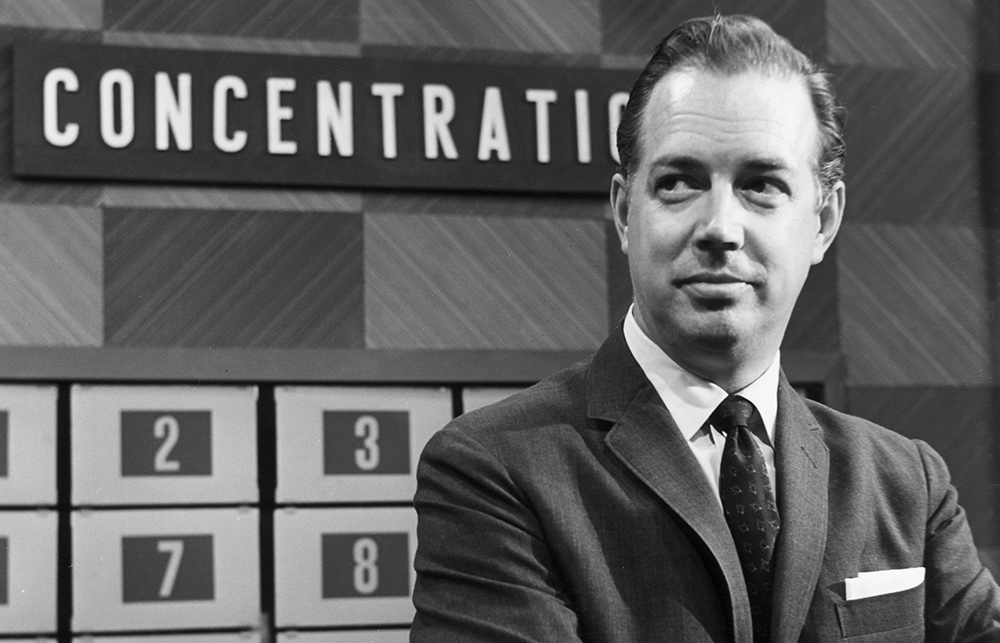休?唐斯是一位極具紳士風(fēng)度且多才多藝的主持人,也是最為電視觀眾熟知和喜愛的節(jié)目主持人之一,,總共制作過超過15,000多個(gè)小時(shí)的新聞,、綜藝和脫口秀節(jié)目,去世時(shí)享年99歲,。
據(jù)其曾侄女莫莉?沙欣表示,,7月1日,唐斯在自己位于亞利桑那州斯科茨代爾的家中因自然原因去世,。

長期以來,,唐斯都是《吉尼斯世界紀(jì)錄大全》認(rèn)證的“出鏡時(shí)間最長的電視人”,,其紀(jì)錄直到2004年才被里吉斯?菲爾賓打破。
他曾經(jīng)在美國全國廣播公司(NBC)主持新聞節(jié)目《Today》,、《Tonight》,、游戲節(jié)目《Concentration》,并與芭芭拉?沃爾特斯共同主持過美國廣播公司(ABC)電視新聞雜志節(jié)目《20/20》,,還在美國公共電視網(wǎng)(PBS)主持過系列節(jié)目《Over Easy》和《Live From Lincoln Center》,。
1986年,唐斯在接受美聯(lián)社采訪時(shí)說:“我參與過許多不同節(jié)目的制作工作,,有時(shí)甚至要在同一時(shí)段錄制好幾檔節(jié)目,。記得有一次我說,除了體育解說,,其它所有類型的電視或廣播節(jié)目我都做過了,。而后來我就想起自己其實(shí)連體育解說也做過,那是在1939年,,我解說了一場在俄亥俄利馬舉辦的拳擊比賽,。”
唐斯18歲時(shí)開始了自己的主持生涯,,最初是在俄亥俄的一家小型廣播公司擔(dān)任播音員,,周薪12美元。電視出現(xiàn)時(shí),,他起初也是嗤之以鼻,,但很快就意識到“電視或?qū)⒊蔀槲磥硎澜绲耐跽撸约鹤詈媚軈⑴c其中”,。
20世紀(jì)50年代的芝加哥是電視節(jié)目的搖籃,,唐斯曾經(jīng)在這里擔(dān)任《庫克拉、弗蘭和奧利》(Kukla, Fran & Ollie)和《霍金斯瀑布》(Hawkins Falls)等節(jié)目的播音員,而后者在唐斯眼中乃是電視史上肥皂劇的鼻祖,。1954年,,他前往紐約,參與制作《家庭秀》(The Home Show),。
1961年,,《新聞周刊》稱其為“頭腦極為靈活同時(shí)對知識如饑似渴的讀者,像頂級貴賓犬一樣天賦異稟又從不懈怠,。
他聲譽(yù)極佳,,為了避免在自己的節(jié)目中出現(xiàn)爭議,他甚至拿到了電視臺的授權(quán),,允許由他自行決定是否播送分配給他的廣告,。
他曾說:“我要向觀眾負(fù)責(zé)。這是明智的選擇,,如果沒有信譽(yù),,那我對客戶而言還有什么價(jià)值?”
1997年,,他再次展現(xiàn)了自己原則性的一面,,為了不在《20/20》的節(jié)目中采訪深陷性侵丑聞的體育節(jié)目主持人馬夫?阿爾伯特,唐斯選擇休假一天,。
唐斯對科學(xué)特別感興趣,,有一次在和帕爾一起主持節(jié)目時(shí),他突然來了一大段獨(dú)白,,介紹滑水背后的科學(xué)原理,。聽完他高談闊論的帕爾調(diào)侃他說:“好吧,休,,你要是淹死了肯定知道自己是怎么死的,。”
從他主持公共廣播節(jié)目《Over Easy》和《20/20》的許多片段中,,很明顯就能看出他對老齡化問題的興趣,,這一興趣甚至讓他拿到了老年醫(yī)學(xué)的研究生學(xué)位。
他說:“在我們的文化中,,過分強(qiáng)調(diào)‘青春無限好’的觀念讓我們深受其苦,。社會在某種程度上缺少對年長者的尊重,從而讓我們失去了從年長者那里汲取智慧的機(jī)會,。我們并沒有意識到,隨著年齡增長,,除了年老體衰,、體弱多病,還有其他寶貴的財(cái)富?!?
唐斯還是一位富有冒險(xiǎn)精神的人,,從他主持《20/20》節(jié)目就可以看出。在節(jié)目中,,他曾騎過虎鯨,,也曾戴著呼吸器在海水中與大白鯊共舞。還有一次尤為驚險(xiǎn)南極探險(xiǎn),,有位同伴在途中險(xiǎn)些喪命,。
他說:“我對科學(xué)、環(huán)境,、醫(yī)學(xué)和某些人格特別感興趣,。我只做自己想做的選題,而不只是做主持人的工作而已,?!?
在短暫擔(dān)任NBC《家庭秀》的主持人后,唐斯于1957年開始擔(dān)任帕爾的主持搭檔,。
1960年2月發(fā)生了一起轟動性事件,,當(dāng)時(shí),在直播中,,帕爾因?yàn)殡娨暸_減掉了自己一段不受審查歡迎的“洗手間”笑話而憤然離場,。面對突發(fā)情況,唐斯冷靜地告訴觀眾:“我覺得后面應(yīng)該還有戲”,,并且主持完了剩下的節(jié)目,。唐斯的妥善處理為自己贏得了廣泛贊譽(yù)。
唐斯后來說,,他當(dāng)時(shí)確實(shí)希望帕爾能隨時(shí)回到節(jié)目現(xiàn)場,,“抖幾個(gè)包袱或者說幾個(gè)笑話,但他并沒有回來,?!辈贿^唐斯也表示,這場鬧劇客觀上推動了他職業(yè)生涯的發(fā)展,。
幾周之后,,帕爾才重新回到了節(jié)目中。
1962年,,帕爾離開《Tonight》節(jié)目,,為約翰尼?卡森的上位鋪平了道路。而唐斯則開始了自己在《Today》節(jié)目的9年主持生涯,。在此期間,,華爾特斯曾經(jīng)在《Today》與唐斯共事,,她非常贊賞唐斯的為人,稱其非??犊?,同時(shí)很有合作精神。
在其于1995年出版的《電視機(jī):電視口述史,,1920-1961年》一書中,,唐斯謙虛地表達(dá)了自己的觀點(diǎn):“從某種程度上說,擁有的或可以展示的才能越少,,就越不容易過度曝光,,也就越不需要面對因之而來的麻煩?;蛟S正因?yàn)槿绱?,我才能在電視行業(yè)工作得比其他人時(shí)間都長?!保ㄘ?cái)富中文網(wǎng))
譯者:Feb
休?唐斯是一位極具紳士風(fēng)度且多才多藝的主持人,,也是最為電視觀眾熟知和喜愛的節(jié)目主持人之一,總共制作過超過15,000多個(gè)小時(shí)的新聞,、綜藝和脫口秀節(jié)目,,去世時(shí)享年99歲。
據(jù)其曾侄女莫莉?沙欣表示,,7月1日,,唐斯在自己位于亞利桑那州斯科茨代爾的家中因自然原因去世。
長期以來,,唐斯都是《吉尼斯世界紀(jì)錄大全》認(rèn)證的“出鏡時(shí)間最長的電視人”,,其紀(jì)錄直到2004年才被里吉斯?菲爾賓打破。
他曾經(jīng)在美國全國廣播公司(NBC)主持新聞節(jié)目《Today》,、《Tonight》,、游戲節(jié)目《Concentration》,并與芭芭拉?沃爾特斯共同主持過美國廣播公司(ABC)電視新聞雜志節(jié)目《20/20》,,還在美國公共電視網(wǎng)(PBS)主持過系列節(jié)目《Over Easy》和《Live From Lincoln Center》,。
1986年,唐斯在接受美聯(lián)社采訪時(shí)說:“我參與過許多不同節(jié)目的制作工作,,有時(shí)甚至要在同一時(shí)段錄制好幾檔節(jié)目,。記得有一次我說,除了體育解說,,其它所有類型的電視或廣播節(jié)目我都做過了,。而后來我就想起自己其實(shí)連體育解說也做過,那是在1939年,,我解說了一場在俄亥俄利馬舉辦的拳擊比賽,?!?
唐斯18歲時(shí)開始了自己的主持生涯,,最初是在俄亥俄的一家小型廣播公司擔(dān)任播音員,,周薪12美元。電視出現(xiàn)時(shí),,他起初也是嗤之以鼻,,但很快就意識到“電視或?qū)⒊蔀槲磥硎澜绲耐跽撸约鹤詈媚軈⑴c其中”,。
20世紀(jì)50年代的芝加哥是電視節(jié)目的搖籃,,唐斯曾經(jīng)在這里擔(dān)任《庫克拉、弗蘭和奧利》(Kukla, Fran & Ollie)和《霍金斯瀑布》(Hawkins Falls)等節(jié)目的播音員,,而后者在唐斯眼中乃是電視史上肥皂劇的鼻祖,。1954年,他前往紐約,,參與制作《家庭秀》(The Home Show),。
1961年,《新聞周刊》稱其為“頭腦極為靈活同時(shí)對知識如饑似渴的讀者,,像頂級貴賓犬一樣天賦異稟又從不懈怠,。
他聲譽(yù)極佳,為了避免在自己的節(jié)目中出現(xiàn)爭議,,他甚至拿到了電視臺的授權(quán),,允許由他自行決定是否播送分配給他的廣告。
他曾說:“我要向觀眾負(fù)責(zé),。這是明智的選擇,,如果沒有信譽(yù),那我對客戶而言還有什么價(jià)值,?”
1997年,,他再次展現(xiàn)了自己原則性的一面,為了不在《20/20》的節(jié)目中采訪深陷性侵丑聞的體育節(jié)目主持人馬夫?阿爾伯特,,唐斯選擇休假一天,。
唐斯對科學(xué)特別感興趣,有一次在和帕爾一起主持節(jié)目時(shí),,他突然來了一大段獨(dú)白,,介紹滑水背后的科學(xué)原理。聽完他高談闊論的帕爾調(diào)侃他說:“好吧,,休,,你要是淹死了肯定知道自己是怎么死的?!?
從他主持公共廣播節(jié)目《Over Easy》和《20/20》的許多片段中,,很明顯就能看出他對老齡化問題的興趣,,這一興趣甚至讓他拿到了老年醫(yī)學(xué)的研究生學(xué)位。
他說:“在我們的文化中,,過分強(qiáng)調(diào)‘青春無限好’的觀念讓我們深受其苦,。社會在某種程度上缺少對年長者的尊重,從而讓我們失去了從年長者那里汲取智慧的機(jī)會,。我們并沒有意識到,,隨著年齡增長,除了年老體衰,、體弱多病,,還有其他寶貴的財(cái)富?!?
唐斯還是一位富有冒險(xiǎn)精神的人,,從他主持《20/20》節(jié)目就可以看出。在節(jié)目中,,他曾騎過虎鯨,,也曾戴著呼吸器在海水中與大白鯊共舞。還有一次尤為驚險(xiǎn)南極探險(xiǎn),,有位同伴在途中險(xiǎn)些喪命,。
他說:“我對科學(xué)、環(huán)境,、醫(yī)學(xué)和某些人格特別感興趣,。我只做自己想做的選題,而不只是做主持人的工作而已,?!?
在短暫擔(dān)任NBC《家庭秀》的主持人后,唐斯于1957年開始擔(dān)任帕爾的主持搭檔,。
1960年2月發(fā)生了一起轟動性事件,,當(dāng)時(shí),在直播中,,帕爾因?yàn)殡娨暸_減掉了自己一段不受審查歡迎的“洗手間”笑話而憤然離場,。面對突發(fā)情況,唐斯冷靜地告訴觀眾:“我覺得后面應(yīng)該還有戲”,,并且主持完了剩下的節(jié)目,。唐斯的妥善處理為自己贏得了廣泛贊譽(yù)。
唐斯后來說,,他當(dāng)時(shí)確實(shí)希望帕爾能隨時(shí)回到節(jié)目現(xiàn)場,,“抖幾個(gè)包袱或者說幾個(gè)笑話,但他并沒有回來,?!辈贿^唐斯也表示,,這場鬧劇客觀上推動了他職業(yè)生涯的發(fā)展。
幾周之后,,帕爾才重新回到了節(jié)目中,。
1962年,帕爾離開《Tonight》節(jié)目,,為約翰尼?卡森的上位鋪平了道路,。而唐斯則開始了自己在《Today》節(jié)目的9年主持生涯,。在此期間,,華爾特斯曾經(jīng)在《Today》與唐斯共事,她非常贊賞唐斯的為人,,稱其非??犊瑫r(shí)很有合作精神,。
在其于1995年出版的《電視機(jī):電視口述史,,1920-1961年》一書中,唐斯謙虛地表達(dá)了自己的觀點(diǎn):“從某種程度上說,,擁有的或可以展示的才能越少,,就越不容易過度曝光,也就越不需要面對因之而來的麻煩,?;蛟S正因?yàn)槿绱耍也拍茉陔娨曅袠I(yè)工作得比其他人時(shí)間都長,?!保ㄘ?cái)富中文網(wǎng))
譯者:Feb
Hugh Downs, the genial, versatile broadcaster who became one of television’s most familiar and welcome faces with more than 15,000 hours on news, game and talk shows, has died at age 99.
Downs died of natural causes at his home in Scottsdale, Arizona, on July 1, said his great-niece, Molly Shaheen.
“The Guinness Book of World Records” recognized Downs as having logged more hours in front of the camera than any television personality until Regis Philbin passed him in 2004.
He worked on NBC's “Today” and “Tonight” shows, the game show “Concentration,” co-hosted the ABC magazine show “20/20” with Barbara Walters and the PBS series “Over Easy” and “Live From Lincoln Center.”
“I’ve worked on so many different shows and done so many shows at the same time,” Downs said in a 1986 Associated Press interview. “I once said I’d done everything on radio and television except play-by-play sports. Then I remembered I’d covered a boxing match in Lima, Ohio, in 1939.”
Downs began his broadcasting career at the age of 18 as a $12-a-week announcer on a small Ohio radio station. When television came along, he at first looked on it as a gimmick, but quickly realized “it was probably a juggernaut, and I’d better be in on it.”
He was an announcer in Chicago, which was a television incubator in the 1950, for “Kukla, Fran & Ollie” and “Hawkins Falls,” which he said was television’s first soap opera. In 1954, he went to New York for “The Home Show.”
In 1961, Newsweek described him as “a gluttonous reader with a first-rate brain that he keeps curried and exercised like a prize poodle.”
His reputation was such that he even won the right to approve any commercial he was assigned to read, striving to keep dubious claims off the air.
“My loyalty was with the person tuning in,” he said. “It was expedient. If I lost my credibility, what use would I be to a client?”
He showed his principled side again in 1997, when he took a vacation day on “20/20″ rather than be part on a show that included an interview with Marv Albert after the sportscaster was caught in a lurid sexual assault scandal.
Downs had a particular interest in science, once launching into a monologue on the Paar show on the science underlying water-skiing. It prompted Paar to quip, “Well, Hugh, when you drown, you’ll know the reason why.”
His interest in problems of the aging — he even earned a postgraduate degree in gerontology — was highlighted in his Public Broadcasting Service series “Over Easy” as well as many of his “20/20” pieces.
“We all suffer in our culture from the idea ... that youth was the big thing,” he said.“There has been kind of a loss of respect for older people, and we lose gleaning wisdom from older people. We lose the ability to see that impairment and decrepitude don’t necessarily go along with age.”
His work on “20/20″ also showed his adventurous spirit, such as the time he got to ride a killer whale, and another time he put on breathing apparatus to swim near a great white shark. There was a hazardous expedition to the South Pole in which one participant nearly fell to his death.
“I’m interested in science, the environment, medicine and certain personalities,” he said. “I just do the stories I want to do. I don’t want to be just the anchor.”
Downs began his work as Paar’s second banana in 1957, after a stint as host of NBC’s “The Home Show.”
In a highly publicized incident in February 1960, Paar stormed off the air in a dispute involving network cutting a Paar “water closet” (toilet) joke the censors disliked. Downs won praise for calmly telling the audience “I’d like to think this is not final” and keeping the live show running until signoff time.
Downs said later that he expected that Paar would at any minute return to the stage “with some punch line or something. He didn’t.” But Downs said he was eventually grateful for the boost the brouhaha gave his career.
Paar finally returned to the show a few weeks later.
Paar’s departure from “Tonight” in 1962 paved the way for Johnny Carson. Downs, meanwhile, began his nine-year run as host of the “Today” show. Walters was a “Today” colleague for part of that time. She was an admirer of Downs who praised his generosity and collegiality.
He expressed his views modestly in the 1995 book “The Box: An Oral History of Television, 1920-1961”: “In a way the less talent you have or deploy, the less chance you have of overexposure. That may be why I have been on network television more than anybody in the world.”






